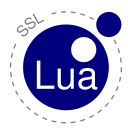 |
| Securing Lua Connections |
 |
| Securing Lua Connections |
home · download · quickstart · references · index
Below is a little introduction on how to get the library up and running with your applications and a little introduction on secure network programming with LuaSSL.
First of all, you'll need OpenSSL 0.9.6 or higher installed on your machine. If you are going to compile the sources of LuaSSL, you'll also need to have the Kerberos' include files (as OpenSSL makes use of them), and you may be required to change the directory in makefile that points to it.
To have the library functions made available to a Lua script, the interpreter running the script must be linked to the luassl library. The functions are registered in the Lua state given as the parameter to the function luaopen_ssllib, the only C function exported by the library. The scripts can then use all registered functions.
The network support in the Lua language could closely mirror the C API or could implement a new, independent, transport layer abstraction. Having an API similar to the C API would make things easier for those who are used to socket programming. On the other hand, the simplicity of the Lua language would be lost. We ended up with something in between, in the sense that function names and semantics have been copied from the C API whenever possible, whereas their usage in Lua has been greatly simplified. Add to that, the strong possibility that this library will become a joint project with luasocket, what greatly suggests that we mimic it's interface.
The first point to be made between plain network connections (done using luasocket) and secure connections, is that by using SSL you're paying both processing time and amount of data sent, to make things secure. Another important point is that you can use all levels of security with SSL, since the most unprotected traffic (almost simillar to plain connections) to the most complex security handled communication.
Although these options are made available through the huge C API of OpenSSL, the Lua binding does not intend to fully supply you with these options. Rather the LuaSSL API is pretty small, aiming a simpler way to make well secured applications.
A good comparison here between the C and LUA API's can be found by the ECHO example :
function server_loop(s)
while true do
local a, e = s:read()
if e == 0 then return true -- 0 for end of file
else if e then return false end end -- halt on anything else
io.write(a)
end
return true
end
local s = ssl.wrap("keys/server.pem", "keys/rootcert.pem", nil, "keys/dh1024.pem")
s:bind(16001)
while true do
s:accept()
print("Connection Opened")
if server_loop(s) then
s:shutdown()
print("Connection Closed")
else
s:clear()
print("Connection Cleared")
end
end
function client_loop (s)
while true do
local a = io.read("*l")
if a == nil then break end
local e = s:write(a.."\n")
if e then return false end
end
return true
end
local s = ssl.wrap("keys/client.pem", "keys/rootcert.pem")
s:connect("localhost", 16001)
print("Connection Opened")
if (client_loop(s)) then
print("Connection Closed")
s:shutdown()
else
print("Connection Cleared")
s:clear()
end
s:free()
home · download · quickstart · references · index